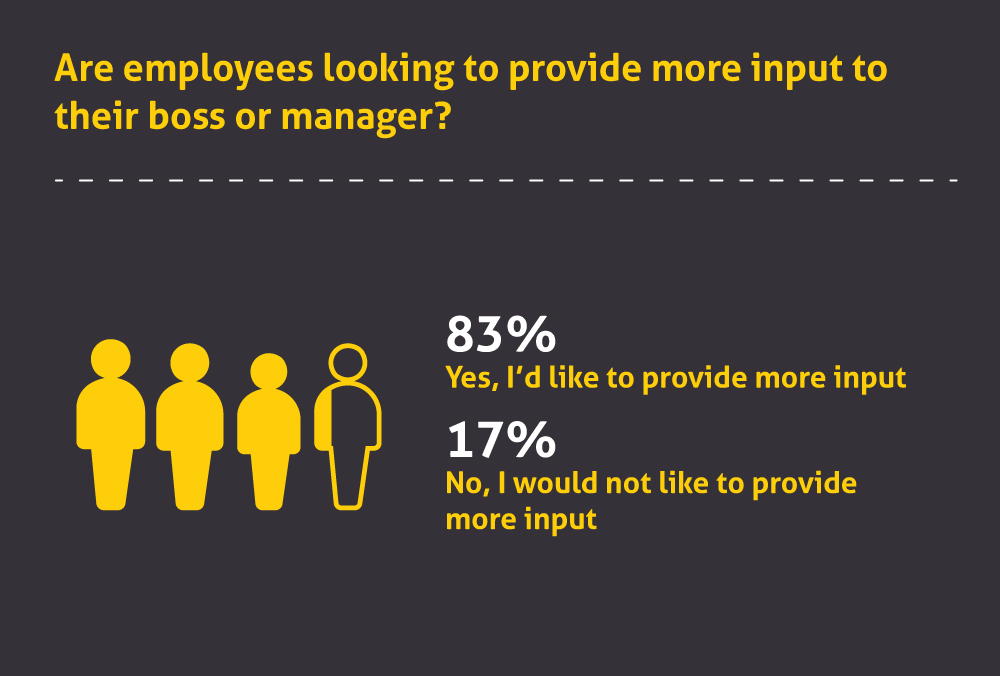Organisations need to completely rethink what it means to lead. It’s not about one person or even those residing at the top anymore. In today’s world, everyone has to adopt a leadership mindset. We have to think of ourselves as members of a leadership community — Patty McCord, former chief talent officer, Netflix
Leadership worship – the act of mythologizing those near the top of organisations – is holding us back now more than ever.
When we look to others to make decisions, set the rules or uphold the culture we actively disempower ourselves, levying a huge inefficiency tax upon our organisations.
How much inefficiency? It could be 75% or higher.

According to a recent report – the vast majority of employees wish their boss or manager would give them more responsibility, with 83% wishing ‘leaders’ would ask for their opinion or input more often.
Far from shirking, employees are actually crying out to make more of a contribution at work.
Those kind of numbers suggest enormous amounts of talent, ideas and innovation are being squandered – all in the name of supporting a hierarchical approach to leadership by the few, rather than the many.
It’s not as if those leaders appear to have all the answers anyway. According to the World Economic Forum 86% of people agree that ‘we have a leadership crisis in the world today’ with an alarmingly weak correspondence between power and competency.
Additionally, a series of reports from MIT argues that current leaders lack the mindset needed to bring about the strategic and cultural changes required to lead in the new digital economy.
So you have two things going on:
- A huge untapped resource begging to be more engaged in decision making
- A growth in ‘management’ and hierarchy with the pay of CEOs in the UK now more than 200 times that of the average worker.
You don’t have to be an expert in innovation to see that’s a busted model.
But is it our own obsession with leadership that is actually supporting this dysfunction?
As Neil Tamplin has written , in today’s world of work people want to be accountable for their own actions and our leaders can’t possibly know the fullness of every decision they make. In our increasingly uncertain operating environments, this model is setting ourselves up to fail because we choose to avoid vulnerability and uncertainty in favour of comfort.
Fear of Failure
So what’s stopping us? One reason organisations might not want to include their employees in their decision-making involves our focus on outcomes and a fear of failure.
The more people involved in decisions means the greater the risk of screwing things up – or so the conventional thinking goes. Mark Robinson has argued though that it’s often better to have poor outcomes with a great decision-making process than it is to have good outcomes with a poor decision-making process. His reasoning is that “you need a culture where people aren’t to blame for decisions. What your culture should be about is learning from bad decisions.”
Perhaps we need to lose the language of leadership altogether.
A Google search for leadership traits reveals a tiresome focus on visioning, strategizing and feedback loops – the kind of management bullshit we should have left back in the 1990s.
The real traits that matter such as empathy or self awareness, are key attributes for all human beings , not just for those of us who have a couple of line reports.
You will be hard-pressed nowadays to find a business that does not have some sort of a mentorship or development programme geared towards the leaders of tomorrow or emerging or aspiring leaders.
Hardly any of those self-same businesses will have programmes aimed at developing the ideas of tomorrow or creating the organisation of tomorrow.
It’s all about leaders.
Arguably we are prioritising the perpetuation of existing systems and structures over meaningful change. Unless we address the root of the system, unless we really address how organisations make decisions and engage people, then we are not changing anything materially.
The new world of work requires us to become less fixated on the leader and more focused on leveraging the community at every level of our organisations.
Breeding the idea of the leader as superhero is getting us nowhere fast.
As we begin a new year the most radical thing you could do is rip up your plans for leadership development – and concentrate instead on how you can democratise innovation for the 80% rather than the 20%.


Leave a comment